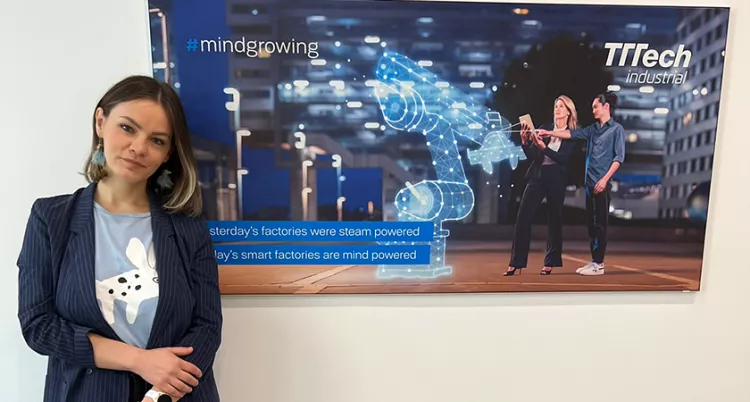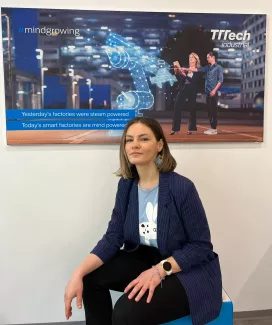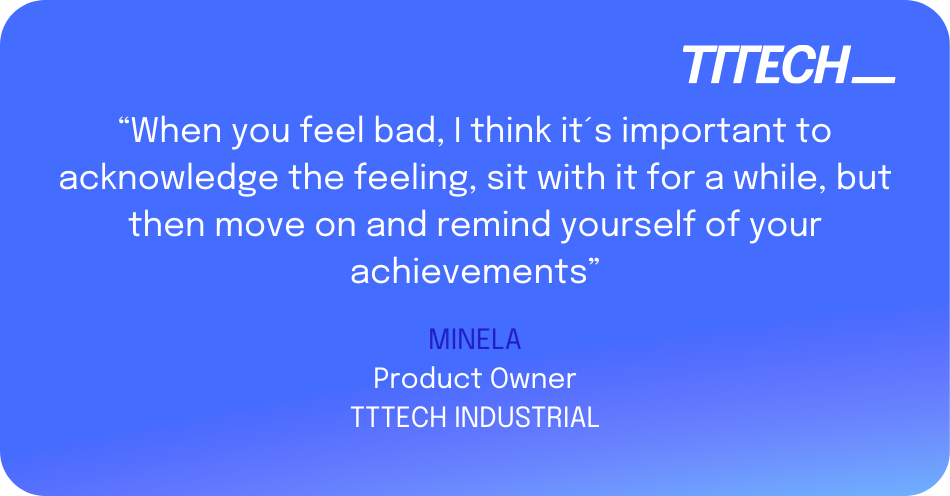
Minela works as a Product Owner at TTTech Industrial in Vienna, focusing on their flagship product Nerve, a core solution in the Industrial Internet of Things. Her career in software development and beyond spans two countries and several industries. In this interview, Minela talks about her personal and professional development, and shares inspiring insights on how mastering challenges can lead to more fulfillment and self-acceptance at work and in life.
Minela, you are currently working as a Product Owner. How would you explain your job to people unfamiliar with software development?
Product Owner is a role within the agile Scrum methodology. I transitioned to the job about one and a half years ago after working as a software developer for almost twelve years. Basically, I act as the interface between the Product Managers and the development teams. I take the PM’s ideas and define and maintain the product’s features, so the developers know exactly what to develop and for what purpose. I also manage the product backlog, prioritize tasks, and make sure everything is tested.
What are the most important skills in this job?
I maintain communication between various stakeholders in the company and make sure everyone understands each other. It’s almost like being a translator, you have to speak people’s language and make sure no important information gets lost on the way from the customer to the developers, and vice versa. Technical knowledge is still important, but I feel like I had to change my mindset from when I was a developer, to think more in a product-centered way. You also need good organizational skills that allow you to handle changes in priorities and re-organize the work fast. You always have to know what’s up next on the agenda and maintain an overview of dependencies and the team’s capabilities.
How long have you been working at TTTech? Can you tell us a little bit about your career path?

My career path is maybe a little bit different from other colleagues working in Vienna in that I started at RT-RK in Bosnia, which is also a TTTech Group company. I was interested in relocating so they offered me a job at TTTech Aerospace in Vienna as a software developer for space projects. Then after that, I got the opportunity to move to TTTech Industrial and I took it.
You have worked in different areas and on different topics over the years, where does the motivation come from?
I always need a challenge in my life. Once I’ve mastered a skill, I want to move on to the next one. Aerospace focuses very much on the safety aspect, there is a lot of documentation; moving to Industrial IoT was interesting to me because it again has a different focus.
How did you get interested in software?
Since I was a kid, I’ve always been good at math and physics. I even made it to the final round in a national math competition. What I love about math is that it’s basically problem-solving, there is always a clear result with no ambiguity. After high school, I decided to study Electrical Engineering and later Automatic Control and Electronics, because you need a lot of math, but it’s also practical problem-solving. I then chose a job in embedded systems because it’s not just software, you always have a connection to the hardware as well, which is what I also worked with during my studies.
What do you want to learn next?
I’d like to work more with customers to learn more about the big picture and the market that our product is part of.
What has been your career highlight so far?
When I was still a software developer, I was put on a project that was more complex than anything I’d worked on before and I really struggled with impostor syndrome. I felt quite alone and doubted myself all the time, but I worked hard, stayed late, and eventually managed to do it. In the end, it went really well, the customer accepted the project immediately, without any criticism. What I learned from this experience was to rely on others – one colleague especially was extremely supportive – but also to rely on myself and build confidence.

Impostor syndrome is something that many women deal with, not just in tech. Do you have any advice on how to overcome it?
What I find very helpful is to tell myself that impostor syndrome isn’t real, it is something that has been instilled in us by society. When I talk to men about it, many won’t even know what it is but almost all women immediately recognize the feeling. So, it’s useful to remind myself that not everything my brain tells me about myself is true. When you feel bad, I think it’s important to acknowledge the feeling, sit with it for a while, but then move on and remind yourself of your achievements. Failure is normal, it’s OK to sometimes not know something, you must learn to forgive yourself for it. I’ve been at it for years and it’s still a work in progress (laughs).
You mentioned supportive colleagues. How do you feel about your current team?
I like the team in Vienna, I’ve worked with them for many years, and they’ve seen me at my best and my worst. I also talk a lot to the team in Novi Sad, so I still have the Balkan connection. I think working with people long-term is great because you can be yourself, everyone knows a bad day doesn’t define you, and vice versa. Having the occasional thing that bugs you is normal, what’s important is that you always communicate your own needs but also understand that other people can have a lot going on, too.